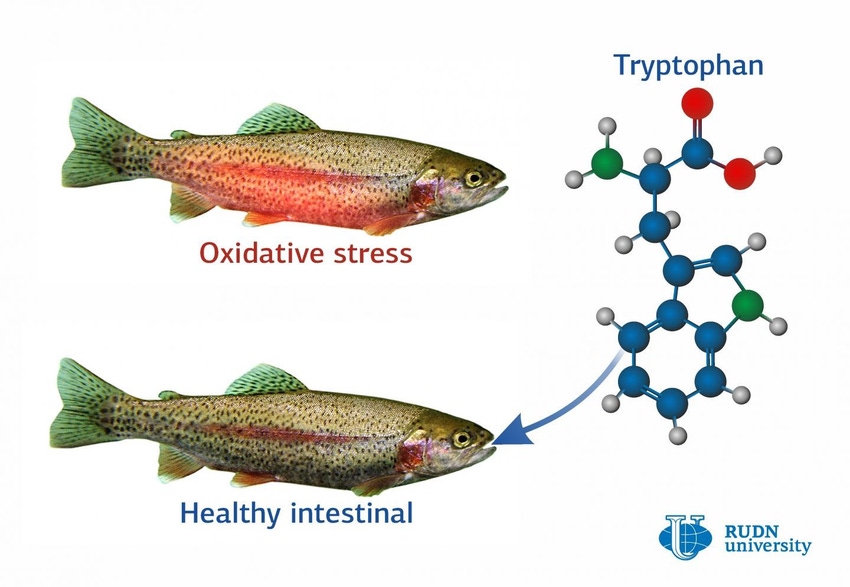When added to fish diets, tryptophan supports immune system and reduces oxidative stress in intestinal tract.
September 4, 2020

A biologist from RUDN University in Moscow, Russia, has determined the most beneficial concentration of tryptophan for rainbow trout, according to an announcement. When added to the diet of the fish, this amino acid supports the immune system and reduces the oxidative stress in the intestinal tract caused by the overpopulation of fish farms.
The results of the study were published in Aquaculture magazine.
RUDN said farmed fish are under constant stress because of overpopulation, transportation, malnutrition and low water quality.
The consequences of overpopulation for fish include weak immunity, changes in chemical processes in their bodies and oxidative stress (cell death as a result of oxidation), the researchers said, noting that oxidative stress, in particular, can cause intestinal tract walls to become thinner, making the fish more susceptible to pathogens.
Researchers from RUDN conducted an experiment and found a way to protect the fish from oxidative stress without putting additional financial burden on fish farms.
The RUDN researchers studied the effect of tryptophan on enzyme activity and the expression of immune genes in the intestinal tracts of fish, the announcement said. Tryptophan is an amino acid that affects the immune system and supports the antioxidant response, i.e., a body's ability to resist oxidative stress.
The subject of the study was rainbow trout (Oncorhynchus mykiss), which is popular in fish farming. Two groups of trout were kept in either an underpopulated enclosure with 15 kg of fish per 1 sq. m or an overpopulated enclosure with 25 kg per 1 sq. m. In each group, three subgroups were identified. Each subgroup got its own diet with either no tryptophan, 5 g or 10 g of tryptophan per 1 kg of feed.
After 70 days, the researchers assessed the level of oxidative stress resistance in the intestinal tracts of the fish by measuring enzyme activity and the expression of genes that participate in immune and antioxidant response, RUDN explained.
The fish that consumed 5 g of tryptophan showed higher stress resistance levels than the fish that received no tryptophan, as enzymes and genes in charge of the antioxidant response were 1.5-2.0 times more active in the 5 g group. However, the higher dosage of 10 g of tryptophan reduced gene expression and slowed down the activity of antioxidant enzymes, the researchers said.
"Adding 5 g of tryptophan per 1 kg of feed increased the immune response in the intestinal tract of rainbow trout and, therefore, reduced the oxidative stress, even in the conditions of overpopulation. However, larger amounts of tryptophan weaken the reaction to stress factors, which may be harmful for fish health," said Morteza Yousefi with the RUDN University department of veterinary medicine.
The results of the study can help prevent the death of fish while preserving a high density of fish population in farms.
You May Also Like
.png?width=300&auto=webp&quality=80&disable=upscale)


